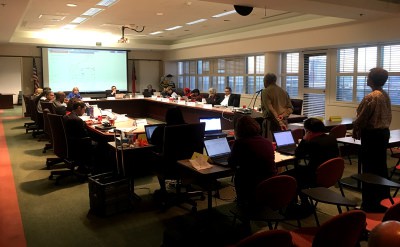The State Board of Education has received a favorable ruling today in its lawsuit against the State’s Rules Review Commission.
The Board brought a lawsuit last year arguing that it was not constitutionally required to submit policies for Commission approval. Since the 1980s, the Board of Education, like many other state agencies, has been required to submit policies to the Commission. Today’s ruling means an end to that process for the Board.
“We are delighted with the Court’s decision,” says former State Supreme Court Justice Bob Orr, the attorney representing the Board. “We feel the constitution is clear on this issue.”
“We will wait to see if the state decides to appeal,” Orr added.
Ann McColl, an attorney and columnist for EdNC, writes:
In a brief order, Judge Paul Gessner rejected the Defendant State’s Motion to Dismiss and allowed the Plaintiff State Board of Education’s Motion for Summary Judgment. This ruling means that the State Board does not have to comply with legislation requiring its policies to be submitted to the Rules Review Commission. This agency could reject State Board policy or require its modification before it could be adopted as a rule. The State Board had complained that as a practical matter, this added months to their process for adopting policy and put an agency without education expertise with veto authority over the constitutional authority of the State Board. With this ruling, the State Board will exercise its constitutional authority and adopt policies through its own process that are binding. The trial court judge was not required to nor did he provide any findings or conclusions that would have illuminated what he found compelling in the Plaintiff’s brief. More background is available in the EdNC article More Arguments Over Power. The State can appeal the ruling.
Here is the order.
Here is EdNC’s litigation summary of this case.
Editor’s Note: Bob Orr is on EdNC’s Board of Directors.

Todd Brantley
Todd Brantley is the senior director of public affairs at The Rural Center. He formerly served as director of policy and research at EducationNC.
He grew up in Randolph County where he attended Farmer Elementary School, Randleman Middle School, and Randleman High School. Todd attended Randolph Community College before graduating from the University of North Carolina at Chapel Hill in 1995. He received a master’s in theological studies from Duke Divinity School in 2002 and a master’s from the UNC School of Journalism and Mass Communication in 2009.
Prior to his work at The Rural Center and EducationNC, Todd also worked as the associate communications director at MDC providing strategic communications support for several programs, including the Bill & Melinda Gates Foundation’s Partners for Postsecondary Success and the Developmental Education Initiative. Todd was part of the writing and research team that produced the 2010 and 2011 State of the South reports. While a graduate student, he interned at The Story with Dick Gordon and was the editor of The Fountain, the alumni magazine for the Graduate School at UNC-Chapel Hill.
He was part of the research and writing team that received the Governmental Research Association’s 2014 Most Distinguished Research Award for a report on the use of telepsychiatry in rural areas. He was a co-author of How the Triangle Gives Back, a 2008 report that examined local philanthropic and charitable giving in the Research Triangle region. His writing and research has appeared in the Daily Yonder; Insight, a publication of the North Carolina Center for Public Policy Research; and NC DataNet, a publication of The Program on Public Life at UNC-Chapel Hill.
A native of North Carolina, Todd currently splits his time between Raleigh and Pikeville, where he helps maintain his wife’s family’s farm. He says, “As a product of this state’s systems of public education, from secondary, to the community college system, to our public postsecondary system, I have seen firsthand how important these institutions are for the social and economic wellbeing of this state and its citizens. Regardless of whether you are a new resident or a native, a parent or not, we all benefit from the fruits of our current system of public learning, and the hard work and foresight of those who came before us who understood that, regardless of political affiliation, North Carolina needed to be a national leader in access to quality education for everyone.”




